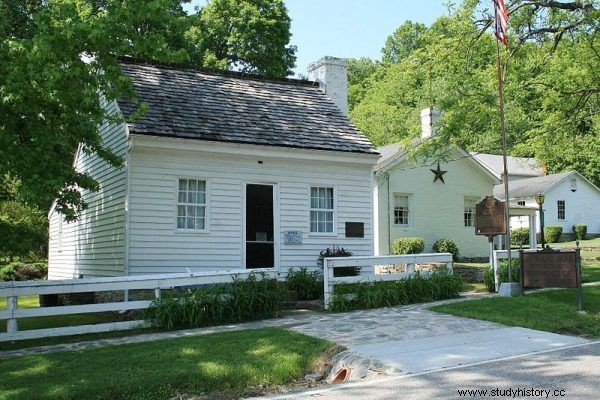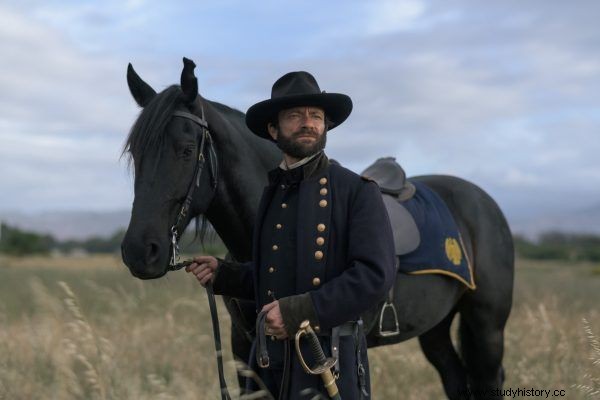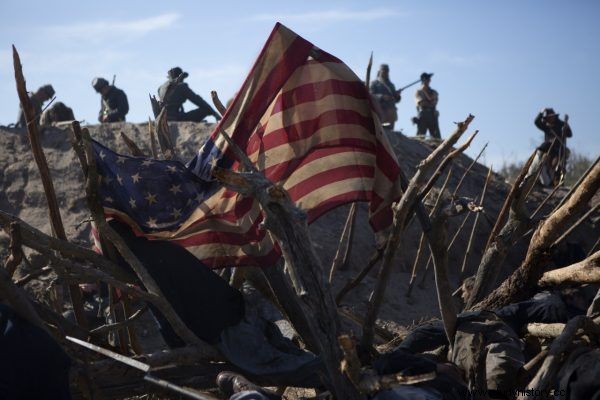"My heart went higher and higher until I felt it already in my throat. I would give anything to be back in Illinois "- so wrote years later about his attack, a man who could not look at blood, but mercilessly wasted it, who hated war, but was in fact made for it.
Yet there was no indication that it would be so. Born in 1822 in Point Pleasant, Ohio, Hiram Ulysses Grant seemed to have a predicted future in which there was no room for the fame and honor of the greatest leaders and politicians.
His father, a tanner by profession, ran his own business and probably hoped that his son would take over his company someday. Unfortunately, the senior of the family met a severe disappointment in this matter. Hiram simply hated the sight of the skinned animals and blood. He was much better at working as a farmer, and since the family owned a lot of arable land, he had something to do. Whenever he could, he devoted himself to reading adventure books and horse riding.
Horse Whisperer in Infantry
Oh yes, young Grant had always felt a great love for horses - as strong as he loathed the smells and sights of the tannery. His contemporaries emphasized his specific approach to mounts and his rare ability to bond with the animal - as if he knew their "language". Therefore, instead of apprenticing with his father, he used his riding skills in broadly understood transport. At 14, he started his own business, but the business was not going as well as he expected.
In this situation, there was only one choice of career path - the army. His father, foreseeing that only military service could bring Hiram up, decided to send him to the academy at West Point. A seat had just become vacant after another candidate from their ward resigned. Grant himself did not want to leave the house. He enjoyed living in the countryside, especially working with horses. After a quarrel with his father, he decided to take this opportunity, although as he repeatedly emphasized:"I did not intend to stay in the army".

Point Pleasant, Ohio. Grant's birthplace
Grant's academy registered as Ulysses Simpson because a congressman friend had forgotten his protégé's name in the letter of recommendation. He absentmindedly typed the boy's mother's maiden name instead. The main stakeholder did not correct it - and it stuck to it that way.
At first, Ulysses was happy with his father's choice. For the young man read in the adventure novels, the arrival from the table as flat as Ohio over the gorges of the Hudson River seemed to be a childhood dream come true. However, he was quickly brought to earth - the demands of iron discipline turned his joy into disappointment and resentment.
He decided that this was not the place for him, and he had not seen any charm in military life. He couldn't imagine what he would do in the army if he somehow graduated from the academy. But a miracle happened. Although during his stay at West Point Grant limited his education to the necessary minimum, focusing primarily on improving equestrian skills, he managed to complete his education within the prescribed 4-year period. A fairly average result, placing him in the 21st place out of 39 alumni, meant that the "horse whisperer" found his way to a much less prestigious infantry regiment.
Lover of alcoholic beverages
His unit was stationed at St. Louis, Missouri, and there, in 1846, Grant was met with the outbreak of a war with Mexico. Our soldier took part in it by chance, although - as he recalled years later:" I bitterly opposed this war, and to this day I consider it one of the most unjust armed conflicts of all time between a strong and weaker nation ”. Such an approach to the subject did not prevent him from showing courage and skills - especially in equestrianism. In the Battle of Monterrey, while delivering an important report, he galloped like a parade in front of the Mexican lines, hanging from the side of a horse so that the steed would protect him.
However, the atrocities of the war disgusted him for good as a soldier, and although the fights with Mexico had earned him a promotion to lieutenant, he was still intent on abandoning his unpopular profession. Frustration and indecisiveness as to his future career was drowning in the glass more and more often. Problems with alcohol dragged on after Ulysses since the times of West Point, where he became famous not only as an excellent cavalryman, but also as a frequenter of local pubs, from which he was often thrown out.

The article was inspired by the series entitled "The General Who Hated War".
Although Grant undoubtedly abused alcohol, he deviated from the stereotype of a common drunk. Historians note that he "drank at irregular intervals, in varying amounts and with different effects." Grant could refuse to take alcohol or drink in moderation without any apparent intoxication. However, when he was sent to a new facility on Lake Ontario in 1851, he was so concerned about his addiction that he helped establish a local branch of the alcohol problem organization, the Sons of Temperance.
Unfortunately, he also had a tendency to get completely drunk, especially when he was depressed and away from his family, especially his wife. In addition, as emphasized by experts on the subject, Ulysses' not very impressive silhouette (he was about 170 cm tall and weighing 60 kg) undoubtedly limited his ability to drink, despite the fact that he was tempted by a military career. It is worth emphasizing that Grant in his addiction did not cross the border of good manners, because no vulgar word was ever heard from his lips. Oh, the salon alcoholic.
The drunken excesses culminated in 1854 at Fort Humboldt, California. Sent to the world's end as a quartermaster - with easy access to whiskey, the newly appointed Captain Ulysses found no understanding with his commander, Colonel Buchanan. Against the backdrop of the scandal over the irregularities in Grant's soldier payroll, a young Ohio officer received an offer he could not refuse:retirement or a military court.
Ulysses just seemed to be waiting for this to happen. Finally, he had reason to give up his hated profession, and at a farewell party for colleagues, he would say, "If you ever hear about me again, I will probably be a successful farmer."
He is fighting!
However, the following years showed how wrong he was. Life without a uniform was even harder to endure than a military drill. It turned out that he did not like hard work on the farm, he was not a real estate dealer, he went bankrupt as a shopkeeper, and taking an accountant only killed him - in short Ulysses did not have the slightest talent for doing business. It even went so far that he was forced to set a gold watch in the pawnshop . Of course, he looked at his problems more and more through the bottom of the whiskey bottle to make it appear a little smaller.
The missiles that fell on Fort Sumter on April 12, 1861, wrenched Grant from his inability to decide about his future - the war between the North and the South that was beginning chose for him. Returning to the army was an opportunity to repair not only the home budget, but also the reputation tarnished by the loss of the army.
As a former professional officer, he was commissioned by the Governor of Illinois to form a volunteer company. Grant exceeded expectations and formed an entire regiment. As a reward, he was promoted to a colonel and command of the 21st Illinois Infantry Regiment, famous for its lack of discipline. The new supervisor quickly took the unruly squad in his hands and set off to conquer history.
In a short time he was promoted to the rank of general, noting a number of successes on his account. Among other things, in February 1862, as part of a combined land-river operation, he seized the strategic Fort Henry, and a week later (this time against orders from above) - Fort Donelson. His demand for the unconditional surrender of the fort earned him the nickname ... "unconditional surrender" (coincidentally with his initials U.S.). A man forced by drunkenness to shed his uniform suddenly became a national hero.
Success-to-success, the Union General was surprised at Shiloh. In April 1862, losing his vigilance for a moment, he did not secure the camp with field fortifications. He only set up individual sentry posts. Confederate commander Gen. Johnston, offended by the recent loss of Fort Donelson, seemed to wait for that.

"I can't throw this man out! He is fighting! ”.
An avalanche of lead from the cannons and muskets fell on Grant's soldiers while resting or drilling. The momentum of the attack was so great that some of Ulysses' troops began to flee in panic. Their commander, however, did not lose his composure. He quickly re-established the line of defense and - taking advantage of the fact that General Johnston was fatally wounded - bloodily repulsed repeated attacks by the Confederates. He won again, but…
As the battle dust settled, there were voices accusing Grant of being careless and (as usual) of alcoholism. President Lincoln came to his aid. Not only has he resisted pressure from critics demanding Ulysses' resignation, he has also stated that would like to know what kind of drink Grant likes, so that other Union commanders would take advantage of him and win like him. On further persuasion, he was to reply:"I cannot throw this man out! He is fighting! ”.
And Grant himself, who hated war and hated the sight of blood, would-be tanner, soon gaining a new nickname - "butcher" - already knew that there was no other way to save the Union other than to completely defeat the South ...
